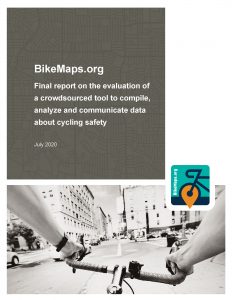 Ottawa, August 26, 2020 (GLOBE NEWSWIRE) – Today, the Traffic Injury Research Foundation (TIRF), in partnership with the University of Victoria and with funding from the Public Health Agency of Canada, released a new report, BikeMaps.org – Final report on the evaluation of a crowdsourced tool to compile, analyze and communicate data about cycling safety.
Ottawa, August 26, 2020 (GLOBE NEWSWIRE) – Today, the Traffic Injury Research Foundation (TIRF), in partnership with the University of Victoria and with funding from the Public Health Agency of Canada, released a new report, BikeMaps.org – Final report on the evaluation of a crowdsourced tool to compile, analyze and communicate data about cycling safety.
Now more than ever, Canadians appreciate the benefits of getting outside, being active, and exploring alternate options for commuting or getting around town. Cities are reassessing the status quo to provide their community members with enhanced options for walking and cycling. It’s a complex process, and in addition to community feedback, data is essential to proposing a well-informed plan. BikeMaps.org is the first of its kind online geo-mapping reporting system designed to collect data on cycling incidents using the power of crowdsourcing, where data is voluntarily submitted by the public through the internet. This technology was implemented and evaluated in nine Canadian cities across five provinces and the Yukon: Victoria, Ottawa, Edmonton, Guelph, St. John’s, Lethbridge, Kelowna, Whitehorse and Winnipeg. BikeMaps.org is also available worldwide with over 9,300 reports submitted from riders in over 40 countries, including Iceland, Germany and Australia.
“The societal benefits of cycling warrant efforts to increase the number of trips taken by bike. But to increase the number of trips taken by Canadians, as well as the number of Canadians engaged in active transportation, cycling must be safe and accessible, and equally important, it has to be perceived by the public as safe and accessible,” explains Ward Vanlaar, COO, Traffic Injury Research Foundation. “This is not yet the case in Canada.”
Survey and focus group (riders and non-riders) results included a significant increase of 33% in the general population who had heard about BikeMaps.org, increased knowledge of mental and physical health benefits of 2.5% and 1.5% respectively as well as environmental benefits (0.5%). Increased ridership was also assessed and results showed there was a 28.1% increase in the amount of time spent cycling, and a 33% increase in the percentage of respondents who primarily used their bikes to get around.
These numbers are encouraging, however, it is important to note that over 15% in most participating cities believe bicycling is unsafe with both real and perceived risks for serious injury. Non-riders who participated in focus groups also shared this sentiment and believed the level of safety depended on the perceived level of education of road users, and the awareness each party possessed regarding the rules of the road. Cycling infrastructure was a significant basis of perceived safety, and often non-riders desired wider bike lanes further away from motor vehicle traffic.
While overall levels of ridership may have increased in North America and cyclist fatalities have declined in the past decades, cyclists are still at a greater risk than automobile drivers of sustaining serious injury and hospitalization.
This publicly provided data help supplement official collision data sources and is analyzed in conjunction to identify hotspots with higher incidents of certain types of reports. These can include a particularly busy downtown street corner with a high incidence of right hooks by turning vehicles or areas carrying greater risks for dooring events. Karen Laberee, Executive Director, BikeMaps.org explains, “Hotspot maps can be used by municipalities to inform their cycling network, and by cycling advocacy groups to demonstrate the need to update unsafe infrastructure.”
In summary, “The involvement of key stakeholders at the local and municipal level is recommended to promote the use of BikeMaps.org data to inform decision-making by municipalities to increase road safety within their communities,” concludes Vanlaar.
Available to download in English and French:
About the Traffic Injury Research Foundation:
The mission of the Traffic Injury Research Foundation (TIRF) is to reduce traffic-related deaths and injuries. TIRF is an independent, charitable road safety research institute. Since its inception in 1964, TIRF has become internationally recognized for its accomplishments in identifying the causes of road crashes and developing programs and policies to address them effectively.
About BikeMaps.org:
BikeMaps.org is a global online mapping tool that allows citizens to map cycling collisions and near misses, and to identify the location of hazards and thefts. The objective of this technology is to promote and encourage safe and accessible bicycling for all. BikeMaps.org was developed in 2014 by the Spatial Pattern Analysis and Research (SPAR) lab at the University of Victoria. Since then, over 9300 reports have been made from riders in over 40 countries. For more information, visit www.BikeMaps.org.
About the Public Health Agency of Canada:
The Public Health Agency of Canada empowers Canadians to improve their health. In partnership with others, its activities focus on preventing disease and injuries, promoting good physical and mental health, and providing information to support informed decision making. It values scientific excellence and provides national leadership in response to public health threats.
– 30 –
For more information, please contact:
Karen Bowman
Director, Marketing and Communications
Traffic Injury Research Foundation
613-238-5235 (office)
1-877-238-5235 (toll-free)
250-797-0833 (direct)
613-238-5292 (fax)
tirf@tirf.ca / karenb@tirf.ca
